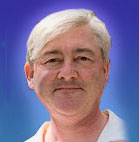The KIDMM group story
KIDMM stands for ‘Knowledge, Information, Data and Metadata Management’. In practice it has operated since 2006 as an email discussion and newsgroup community, although it has also provided the enabling framework for a number of ‘in real life’ meetings and conferences. Membership of the group first grew within the British Computer Society (BCS), but has since expanded.
Caveat! The following notes are from my own records and recollections, which I shall refine in time if corrected…
The background: how the ‘KIDMMites’ met
The structure of the British Computer Society hosts several dozen ‘Specialist Groups’ (SGs), which for years operated without much awareness of each others’ activities. Shortly after the millennium, a BCS initiative of holding six-monthly ‘SG Assemblies’ provided opportunities to build better contact between the groups, and some began to hold joint meetings.
In the process, several SGs discovered an overlapping interest in the way that information and data are (or should be) managed, both in general and using computer technology. As for me, I was active in the BCS Electronic Publishing Specialist Group (EPSG) — and I think it’s fair to say that the publishing business is concerned with how knowledge is preserved and transmitted. Publishing also has an intellectual interface to librarianship, and both these fields of professional activity were in the throes of radical transformation under the impact of the Internet and the Web. For example, we were becoming acutely aware of the need to talk to our colleagues in Information Retrieval.
Merging streams
Several KIDMM ‘tributaries’ can be identified:
- Five or six BCS SGs which were concerned with computer use in the health service (Primary Care SG, Nursing SG and others) were collaborating in ‘Clinical Information’ meetings and organised themselves into a co-ordinating group, which the BCS later formed into the Health Informatics Forum.
- In January 2003, the Information for Development Forum convened a round-table discussion led by John Lindsay of the BCS Developing Countries Specialist Group. David Penfold and I participated from EPSG. The topic was ‘Information Literacy, the Information Society and international development’ in anticipation of the forthcoming United Nations World Summit on the Information Society (2005). (That IDF/DCSG meeting gets its own page on this site; a full 29-page report is also available from there.)
- A catalytic moment came at the second BCS Specialist Groups Assembly meeting at at Bletchley Park, in Spring 2003. David Penfold spoke about the concept of Metadata, then of growing importance in publishing, librarianship and information retrieval. Several SGs present were interested, but according to David some had quite a different concept about what ‘metadata’ might mean. I believe David subsequently gave talks on metadata to other SGs, including the Configuration Management Group. (The content of David’s talk was ‘archived’ by the BCS, who have subsequently lost it!)
- At a subsequent SG Assembly (Spring 2005?), the BCS management were talking up the concept of ‘Forums’ as supra-Specialist Group entities under which SGs were being encouraged to operate. That idea was resisted — it was seen as the BCS trying to control SG activities — but it did lead to a workshop discussion about possible naturally emergent ‘bottom-up’ forum-like groupings. I suggested that several SGs appeared to share a concern for ‘Knowledge & Information & Data Management’. About a dozen email addresses were collected and I co-ordinated subsequent discussions on the idea.
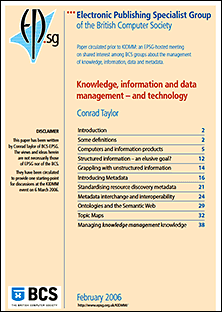
An exploratory paper
Two developments ensued. The BCS Electronic Publishing Specialist Group decided to host a round table meeting, which was planned for 6 March 2006. In the meantime, I wrote a 39-page paper called ‘Knowledge, information and data management — and technology’ — a strictly personal view, which I circulated as a spur to thinking ahead of the meeting.
That paper touched on the following topics: ¶ Definitions: what is information, knowledge? data? ¶ Computers and the library ¶ Computers and information products – impacts of 1970s word processing and typesetting ¶ Bringing structure to free text through markup – GenCode, SGML and XML ¶ Data-based information creation ¶ Information Retrieval and free text search ¶ Metadata and its role, illustrated ¶ Categorisation ¶ Standardising metadata for interoperability: Z39.50, IPTC, XMP, RDF ¶ Ontologies & the Semantic Web ¶ Topic Maps ¶ knowledge management concepts, explicit & implicit knowledge.
- Download paper from this link (PDF, 39 pp, 1 MB).
An inaugural KIDMM seminar
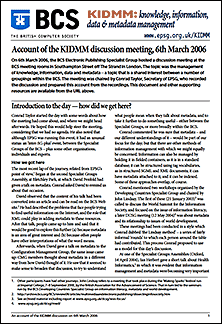
The EPSG-sponsored event on 6 March 2006 was held in the BCS meeting rooms in Southampton Street and twenty people took part in the event, representing various BCS Specialist Groups including EPSG, Data Management SG, Information Retrieval SG, Artificial Intelligence SG, several members of the BCS Knowledge Services Board, the BCS Webmaster and some external individual participants.
(In alphabetical order: John Alexander — Zinat Bennett — Martin Bryan — Francis Cave — Terry Freedman — Keith Gordon — Berin Gowan — Carl Harris — Genevieve Hibbs — Nic Holt — Robin Kyd — John Lindsay — Andy MacFarlane — Ken Moore — David Penfold — Miltos Petrides — Conrad Taylor — Andrew Tuson — Judi Vernau — Adrian Walmsley)
The meeting ran mostly in a round-table discussion format chaired by me (Conrad). Judi Vernau made a presentation about metadata (as publishers and librarians understand the term); Francis Cave talked about some standards-making efforts relevant to information managements such as Document Schema Definition Languages and Topic Maps.
The afternoon session was a wide-ranging discussion which touched, amongst other subjects, on the organisation of the BCS’s own Web site, on taxonomies and thesauri, and on how data management people operate with a different definition of ‘metadata’.
- Download the full report of the 6 March 2006 discussions (PDF, 35 pp).
Establishment of the KIDMM e-list
Within a couple of months, David Penfold set up an email discussion list using the JISCmail listserver facility for Higher Education, and ‘BCS-KIDMM’ has been running now for more than ten years, with Conrad as moderator and occasional stirrer-up. The list currently has about 80 members, most of whom ‘lurk’; at time discussion is active, at other times the list goes to sleep for long intervals.
A notable early trend was that KIDMM gained interest and participation on the list from ISKO UK, the newly-formed UK chapter of the International Society for Knowledge Organization. Some members of the list are also associated with NetIKX, the Network for Information and Knowledge Exchange.
One of the very useful functions of the e-list is as a mechanism for members of one group to alert members of other groups about forthcoming events, which helps both to boost attendance and to provide additional opportunities for meeting in person. It’s not uncommon to attend an event where half a dozen or more KIDMMites are present.
London panel discussion on classification (2006)
In the first few years of KIDMM, most of the practical support was provided by the Electronic Publishing Specialist group of the BCS – then in its last few years of operating. For example, a section of the EPSG Web site was set up to document KIDMM.
On 20 June 2006, EPSG hosted an evening meeting at the London College of Communication on the topic ‘Approaches to Classification in Publishing and Knowledge Management’. The meeting heard presentations by KIDMM list members Leonard Will, John Lindsay and Nic Holt, then turned into a lively discussion between the panel members and the audience.
- Download MP3 audio recording of the three speakers’ presentations (40MB, 62 minutes)
- Download MP3 audio recording of the subsequent panel discussion chaired/led by Conrad Taylor (35.3MB, 50 minutes)
2007 ‘MetaKnowledge Mash-up’
Then on 17 September 2007, KIDMM having garnered some support from the Knowledge Services division of the British Computer Society, ran a one-day conference at the BCS meeting rooms off the Strand. The event was dubbed the MetaKnowledge Mash-up and was attended by over 90 people from diverse backgrounds: 10 BCS specialist groups or forums, three university libraries, several university departments of computing or information science, the British Library and The National Archive, two museums, ISKO UK, the Metropolitan Police, a new national and local government departments, two large consulting firms, and many independent consultants.
Eight speakers gave presentations, planned or impromptu; we have five sets of Powerpoint slides, two audio recordings, and a very detailed write-up of the entire event, which will soon be placed on a dedicated page to mark this event.
‘Issues in Informatics’ poster project, 2007
In early 2007, the KIDMM initiative got some small funding from the BCS, towards an event (see below) plus a project to create what was conceived as a potential travelling exhibition about ‘Issues in Informatics’ – the idea was that it could possibly tour British universities to raise awareness of aspects of information handling that lie behind everyday life.
In the event, the project failed due to people not having the time to commit to creating content. Two posters were prepared and inkjet-printed onto tough flexible vinyl be way of demonstration – one about the text encodings which lie behind our ability to send texts across networks, the other about the concept of Markup (e.g. typesetter codes, GenCode, SGML, HTML).
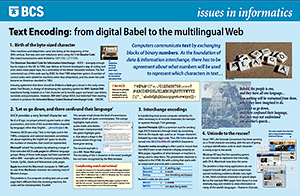
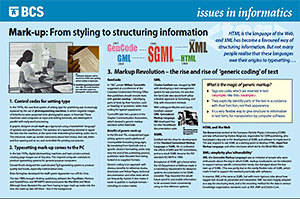
2008 ‘Making and organising knowledge in communities’ event
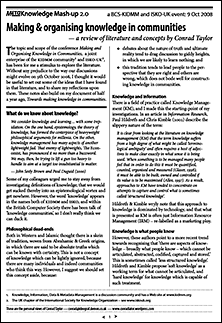
This event on 9 October 2008 was designed as a follow-up ‘MetaKnowledge Mash-up 2.0’ gathering, to expand on an aspect of knowledge-gathering and organisation which had emerged in the 2007 event. It was conceived as a joint project of KIDMM and ISKO UK and was designed and co-ordinated by Bob Bater (for ISKO) and Conrad Taylor (for KIDMM).
Regrettably, this event was not written up in the style of the 2007 one, and we are looking into what records of it might remain.
One artefact which does remain, is a pre-conference ten-page ‘review of literature and concepts’ including explorations of concepts of the relationship between knowledge and information as put forward by Liz Orna; the somewhat different concepts of ‘tact knowledge’ put forward by Michael Polyani and Ikujiro Nonaka; Julian Orr’s accoount of knowledge-sharing on the job at Xerox; and the concept of ‘Communities of Practice’ as set out in the book of the same name by Etienne Wenger. The paper also touched on Clay Shirky’s concept of enabling community participation through lowered ‘transactional costs’ in electronic networks.
2009: wiki workshop at Brunel university
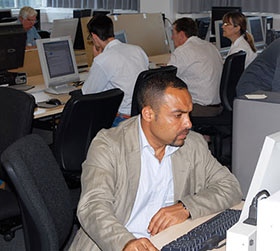
Group exercise, putting together a KIDMM wiki at the Brunel 2009 workshop
At the 2008 event, there had been speculation that KIDMM might develop a Community-of-Practice type Web site either as a supplement to the JISCmail discussion list, or perhaps even as a replacement for it; and we had an offer from a graduate student of librarianship with advanced programming skills to create such a thing from scratch as a student project. However, her life circumstances meant that she was unable to rise to the challenge.
Therefore in early 2009, some discussion on the list turned to what alternatives existed for collaboratively assembling knowledge. Interest was expressed in holding a one-day workshop to explore the potential of wikis, and Professor Marilyn Leask offered to host this at Brunel University.
The event was noteworthy for a free account which KIDMM member Richard Millwood had created for us at the wiki hosting site ‘Wikispaces’. Over lunch, we borrowed the Education Department’s computer instruction room and Richard gave us a hands-on tutorial into how to create and organise content there.
Recently a folder of documents and audio recordings from the day has come to light, so it may soon be possible to document this event better.
To be continued…
